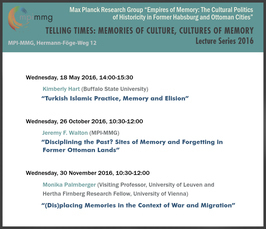“Turkish Islamic Practice, Memory and Elision”
Telling Times: Memories of Culture, Cultures of Memory - Lecture Series 2016
- Datum: 18.05.2016
- Uhrzeit: 14:00 - 15:30
- Vortragende(r): Kimberly Hart (Buffalo State University)
- Kimberly Hart is an Associate Professor at the State University of New York, Buffalo State. Having conducted over a decade of fieldwork in the Yuntdağ, north of Manisa, her work focused on a women’s carpet weaving cooperative, love and marriage, and Islamic practice. Her book, And Then We Work for God: Rural Sunni Islam in Western Turkey, published by Stanford University Press in 2013, was written while a member at the Institute for Advanced Study in Princeton, New Jersey. This year she has a Senior Scholar Fulbright Fellowship to study the street animals of Istanbul. Her new fieldwork considers urban transformation and the secular and Sunni-based configurations of meaning surrounding feline and canine lives in a rapidly changing urban landscape. Much of her work is visually-based and includes photography exhibits, the most recent, “Josephine’s Fragments,” is currently on view at the Erimtan Museum in Ankara.
- Ort: MPI-MMG, Hermann-Föge-Weg 12, Göttingen
- Raum: Conference Room

For more details please contact cziesielsky(at)mmg.mpg.de.
In the western Anatolian region of the Yuntdağ, villagers debate the efficacy of their Islamically-based spiritual practices. Villages differentiate local identities through the particular characteristics of village practice, such as the performance of Sakal-i Şerif (veneration of the hair of the prophet), veneration of local saints, variations on good deeds (hayır), the performance of mevluts, and so on. I will discuss the connections villagers make between the particulars of their practices and the Empire or Republic. In particular, I will show that in some communities, villagers maintain cultural memories from the Ottoman Empire and through these connect to the state. In others, they wipe out that past to create a newer sense of orthodoxy located in contemporary Republican history. This talk is based on my monograph, And Then We Work for God: Rural Sunni Islam in Western Turkey.